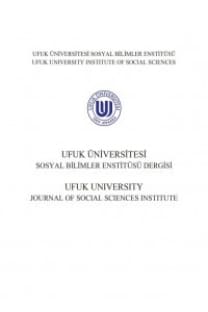Algılanan İş Güvencesizliğinin İş Performansına Etkisi: Örgütsel Desteğin Düzenleyici Rolü
Artan rekabetin örgütler açısından ortaya çıkardığı yeni çalışma koşulları örgüt-çalışan ilişkilerinde bazı olumsuzlukları da beraberinde getirmiştir. İş güvencesizliği de çalışanlar açısından bir iş stresi olarak ortaya çıkmıştır. Çalışanlar algıladıkları iş güvencesizliğine karşılık olarak çeşitli tutum ve davranışlar geliştirebilmektedir. Bu çalışmanın amacı, algılanan iş güvencesizliğinin iş performansına etkisini ve bu etkide örgütsel desteğin düzenleyicilik rolünü incelemektir. Çalışmada iş performansı; görev performansı ve örgütsel vatandaşlık davranışları alt boyutlarında incelenmiştir. Çalışmanın verileri, kolayda örnekleme yöntemiyle bankacılık sektöründe faaliyet gösteren kurumlardaki 197 çalışandan anket tekniği kullanılarak toplanmıştır. Çalışmanın verileri yapısal eşitlik modellemesi ile analiz edilmiştir. Yapılan analizler neticesinde, algılanan nitel iş güvencesizliğinin örgüte yönelik örgütsel vatandaşlık davranışı üzerinde negatif bir etkiye sahip olduğu ve bu etkide örgütsel desteğin düzenleyicilik rolü üstlendiği tespit edilmiştir. Bununla birlikte, algılanan nitel iş güvencesizliğinin görev performansı üzerinde herhangi bir etkisi tespit edilememiştir. Çalışmada, örgütsel vatandaşlık davranışlarının azalmasına yol açan nitel iş güvencesizliğiyle mücadele etme bağlamında örgütlerin insan kaynakları yöneticilerine öneriler sunulmaktadır
Anahtar Kelimeler:
Algılanan İş Güvencesizliği, İş Performansı, Örgütsel Destek
THE EFFECT OF PERCEIVED JOB INSECURITY ON JOB PERFORMANCE: THE MODERATING ROLE OF ORGANIZATIONAL SUPPORT
New working conditions found out increased competition for organizations raised some negative results in organization-employee relations. Job insecurity emerged as a job stressor for employees. Employees may have various attitudes and behaviors in response to perceived job insecurity. The aim of this study is to examine the effect of perceived job insecurity on job performance and the moderating role of organizational support in this effect. Job performance was examined in terms of task performance and organizational citizenship behaviors. The data of the study were collected by using the questionnaire technique from 197 employees working in the banking sector by easy sampling method. The data of the study were analyzed with structural equation modeling. As a result of the analyzes, it was found that perceived qualitative job insecurity had a negative effect on organizational citizenship behavior towards the organization and that organizational support had a moderating role in this effect. However, there was no effect of perceived qualitative job insecurity on task performance. Suggestions will be offered to human resources managers for coping with qualitative job insecurity, which leads to reduction in organizational citizenship behaviors
___
- Aiken, L.S., & West, S.G. (1991). Multiple regression: Testing and ınterpreting ınteractions. Newbury Park: Sage Publications, Inc.
- Ashford, S. J., Lee, C., & Bobko, P. (1989). Content, causes, and consequences of job insecurity: A theory-based measure and substantive test. Academy of Management Journal, 32(4), 803-829.
- Bal, P. M., Chiaburu, D. S., & Jansen, P. G. (2010). Psychological contract breach and work performance: Is social exchange a buffer or an intensifier?. Journal of Managerial Psychology, 25(3), 252-273.
- Bateman, T.S., & Organ, D.W. (1983). Job satisfaction and the good soldier: The relationship between affect and employee “citizenship”. Academy of Management Journal, 26(4), 587-595.
- Blau, P.M. (1964). Exchange and power in social life. New York: John Wiley.
- Bohle, S.A.L., Chambel, M.J., Medina, F.M., & Cunha, B.S.D. (2018). The role of perceived organizational support in job insecurity and performance. Journal of Business Management, 58(4), 393-404.
- Borg, I., & Elizur, D. (1992). Job insecurity: Correlates, moderators and measurement, International Journal of Manpower, 13(2), 13-26.
- Borman, W.C., & Motowidlo, S.J. (1997). Task Performance and contextual performance: The meaning for personnel selection research. Human Performance, 10, 99-109.
- Callea, A., Urbini, F., & Bucknor, D. (2012). Temporary employment in Italy and its consequences on gender. Gender in Management: An International Journal, 27(6), 380- 394.
- Cheng, G.H.L., & Chan, D.K.S. (2008). Who suffers more from job insecurity? A meta-analytic review. Applied Psychology, 57(2), 272-303.
- Chin, W.W., Marcolin, B.L., & Newsted, P.R. (2003). A partial least squares latent variable modeling approach for measuring interaction effects: Results from a Monte Carlo simulation study and an electronic-mail emotion/adoption study. Information Systems Research, 14(2), 89-217.
- Chin, W.W. (2001). PLS-graph user’s guide version 3.0. Houston, Texas: C.T. Bauer College of Business, University of Houston.
- Chirumbolo, A., & Areni, A. (2005). The influence of job insecurity on job performance and absenteeism: The moderating effect of work attitudes. Sa Journal of Industrial Psychology, 31(4), 65-71.
- Chirumbolo, A., & Hellgren, J. (2003). Individual and organizational consequences of job insecurity: A European study. Economic and Industrial Democracy, 24(2), 217-240.
- Costa, S., & Neves, P. (2017). Job insecurity and work outcomes: The role of psychological contract breach and positive psychological capital. Work & Stress, 31(4), 1-20.
- ISSN: 2146-7676
- Başlangıç: 2011
- Yayıncı: Ufuk Üniversitesi
Sayıdaki Diğer Makaleler
Algılanan İş Güvencesizliğinin İş Performansına Etkisi: Örgütsel Desteğin Düzenleyici Rolü
Farklılaşma ve Ayrışmanın Sosyolojisi: Tarihselliği Açısından “Kent Deneyimi”
VİX Korku Endeksi ve CDS Primlerinin Büyüme ve Döviz Kuruna Etkisi, Türkiye Örneği
Nil ÇAĞLAR BEKTAŞ, Şenol BABUŞCU
Elif TOKDEMİR DEMİREL, Müge GÜNEŞ AKSU
Varlık Fiyatları Kanalı İçerisinde Hisse Senedi Kanalının İşleyişi: Türkiye Uygulaması
TARTIŞMALI HAKLAR VE ÇEKİŞMELİ KONULAR: TÜRKİYE’DE BİLGİ EDİNME HAKKI ÜZERİNE BİR ÇALIŞMA
MİLLİYETÇİLİK KURAMLARI VE TOPLUMSAL CİNSİYET: GENEL BİR DEĞERLENDİRME
